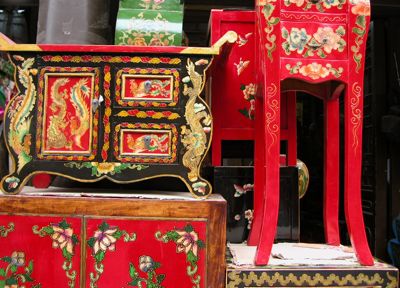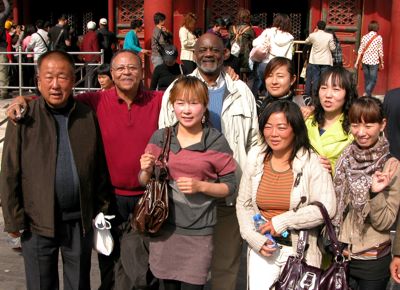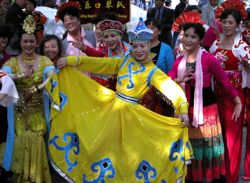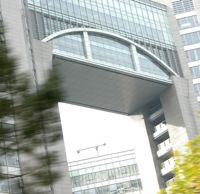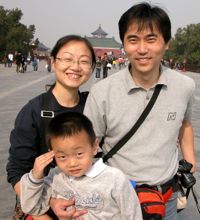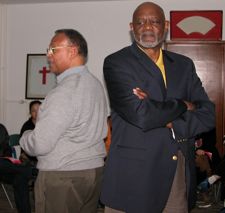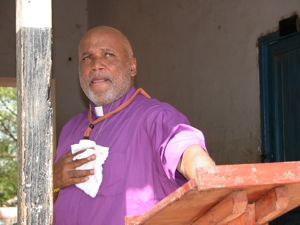
Reconciliation Report
November-December Issue #60
|
Reflecting at Starbucks, Terminal 3, in Beijing--this is perhaps the most unusual team trip that I've led. Never before have I limited the trip to men or to a maximum of four people. Not knowing what to expect, it seemed prudent to keep the team small. Rarely have trip finances been so clearly provided, despite having only two other team members to help cover expenses. The day before departure a check arrived to more than cover what was needed in salary for November, in addition to having expected trip expenses in hand. We've never stayed at the Holiday Inn Express. One-star hotels and mud homes we've stayed in, and the unrated Noah's Ark Guesthouse atop Mt. Elgon, with its stark 20-watt light suggesting an aisle between beds. I've never arrived to discover that there were no planned ministry opportunities. But this is China. A joke among expats in Beijing (BJ) is that people who come for two weeks return and write a book. Those coming for two years return to write an article. Those staying longer go home to write nothing. The biggest concern was how to tell team mates Jack Gaines and Brian Johnson that they had no outlet for their preparations in areas of family, parenting, leadership and reconciliation. After apologizing to them, they immediately began to thank the Lord as we prayed together about the situation. They were thrilled just to be in BJ, to see China, and to see what the Lord would do. I was so thankful that no one else had joined the team, and that they had, because I was feeling quite rejected. They were ideal allies in the situation, rather than grumblers. A saying of Confucius proved useful. "Petty man is always on edge; Great man is always at ease." So what happened? An American who became a dear friend in the past two weeks, who has been in China since the early 80s, told us that nothing is as it appears to be in China. He said that I interpreted a yes-no as a yes-yes, and that my experience wasn't unusual. I asked him, 'How do you tell the difference?' He laughed and said, 'Experience.' We had been preparing to work in a center training young urban professionals, and had been in dialogue about it since March. Perhaps that the center's opening had been delayed and that our host had been heavily involved in planning a conference scheduled on the day of our arrival were the entire reasons, but I thought that perhaps a hall would be rented. The sometimes cryptic and enigmatic correspondence was interpreted as discretion in the face of government scrutiny. Some missionaries in China have been careful in the choice of email vocabulary. Each morning we gathered for prayer and asked the Lord to help us find a viable ministry partner-an open door-- and to guide contacts and activities during that day. I sent an SOS to some intercessors to request prayer for the same, and for strategic meetings, God's guidance, and good stewardship of our time. Returning home was not an option, as I'd tried to arrive a day early, and learned that a ticket change would cost over $2,000 more than the original ticket price. Besides, Brian and Jack wanted to see BJ. Brian said that when he led teams, he learned about a country by visiting cultural sites. Normally we allow a day at the end of a trip for sightseeing. On this trip, we began with it.

At the Forbidden City (Imperial Palace), the deep cultural theme of peace and harmony emerged. We visited the "Hall of Supreme Harmony" (a Taoist phrase) constructed in 1645. As buildings were destroyed by lightening and rebuilt, so the "Hall of Central Harmony" was also rebuilt in 1645 during the Qing Dynasty. There must have been a conflagration, because the "Hall of Preserved Harmony" was also built in 1645. The name comes from the Book of Changes, and means, "maintaining harmony between all things on earth to have a long period of peace and stability." Names of restaurants including the word "happiness" also popped out. The serene layout of the Beijing Zoo, with canals and leaf-canopied walkways, spoke of peace and harmony-what the Chinese seem to be seeking. The name of the place we were going to teach at was the "peace and harmony center". We were told that the Chinese were basically a peace-loving people. We heard that the Cultural Revolution of thirty years ago essentially wiped out many old worldviews, religious ones among them. What was left was Communist propaganda and seeking wealth through economic development, in part to catch up to the West. Of course, materialism is an empty god, and people are seeking something deeper. That Revolution served to sever Christianity from Western association and to indigenize it. Some wondered whether it had died altogether, but it was resurrected in Chinese forms. The spiritual and ethical void is being addressed by the church, and the Chinese house church alone may number over 100 million. She is our ally in global evangelization, as she plans to field at least 100,000 missionaries to Buddhist, Hindu and Muslim countries.1 One cultural interpreter told us that China is changing so fast that the books are dated. He and another expat in separate meetings told us that persecution of the church by the central government is over. Generally it is middle-level old officials who may create problems, and one high-ranking but combative old guard official was promoted to a harmless position. There may be conflict, but not due to direct confrontation from the central government. The current strategy seems to be promotion of religions that compete with Christianity as indicated by prominent Buddhist, Confucian and animist (folk religion) conferences. The government, we were told, is promoting back-to-Chinese-roots religions. 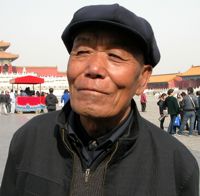 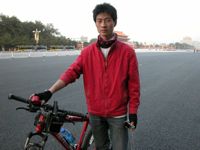
Third Wave churches are emerging in China--those that have followed 1) the (underground) house church and 2) the government-controlled and registered Three Self Patriotic Movement (TSPM) churches. These urban Third Wave churches are neither registered nor underground. They may invite government officials to visit, to demonstrate their transparency. The government tends to consider underground churches to be a threat for the very reason of their secrecy. However, house churches are illegal, and formerly the only alternative, particularly in village areas, was the TSPM, and they are tightly controlled. They cannot teach, we were told, about the Holy Spirit, nor the book of Revelation. They can only conduct ministry within their church building (strangely parallel to the practice of many US churches). Some TSPM churches are vibrant and want to become "unregistered" to avoid restrictions. We also found a deep distrust of foreigners. During the Boxer Rebellion2, which China lost, foreign governments imposed an annual reparation to Western countries equivalent to the national income of the ruling Qing dynasty. This lasted for 55 years and bankrupted the Qing dynasty, whose authority ended in 1911, according to a descendant of that royal family.

We were told the Chinese have long memories. The China Daily had an article titled "Hero helps to rescue foreigner's reputation in Guangzhou" (10/22/09)3 relating how an expat black man had rescued six people from beneath bags of cement after an auto accident, disappearing after his good deed. The government was trying to track him down to give him honor and a reward. Quixotically, Jack and Brian were something of celebrities at the Forbidden City and Olympic Stadium. Chinese wanted pictures with them. It was auspicious to have a photo with a foreigner, perhaps. How to overcome such distrust?-building trust over time. This theme also emerged last year as I sat in on meetings with five sets of house church leaders. Missionaries had to overcome great historical liabilities.
What doors opened for us? Brian was able to teach on reconciliation during a Tuesday night Bible study, and also to preach about how God is brought into focus as we look at Christ, at the same Third Wave church on Sunday morning. This was the first local church that I'd visited. We also visited the BJ International Christian Fellowship Church, exclusively for non-mainland Chinese and expats. We had a chance to share our faith with Jeannie, a young folk Buddhist guide, who asked if we believed in God. She hadn't heard of the Bible. I hope to keep in touch. The hotel provided free passes to a local gym, where I met a personal trainer who is a Brother. We also were encouraged to pursue a ministry partnership with a Chinese brother whom we couldn't meet, his home being distant. This may be the breakthrough for which we have prayed.
Since life is so short, the closed door that we found is as valuable as an open door, since it saves resources of time and money in the future. We leave BJ as we came in, grateful to God for the privilege of learning a little about China, meeting some wonderful people, and seeing pandas, temples, the Great Wall and reports of God obviously at work. My wife Judi emailed that if this trip only served to fix my sensed burnout, it was worth it. Brian's wife wanted to know when he would send HER on a vacation. A threefold cord of fellowship sustained us and filled what could have been an empty trip into one that overflowed with harmony, beauty and gracious instruction. While I haven't spent two years in China, you were nevertheless owed an article. Jim Sutherland |
|||||
|
We plan to return to Eastern Equatoria Province on a fourth ministry trip. We believe that we can put your spiritual gifts to work. In particular, we welcome evangelists (personal and platform) and medical personnel, as we strengthen the foundations for five new church plants. We can use teachers of women and children, youth workers, disciplers and those with the gifts of helps and encouragement. We will be sleeping in tents while in Sudan and you must be in good physical condition. The fee is $2,000, plus roundtrip airfare to Africa from your airport, which can be arranged at an excellent discount. Apply now if God is leading. For more information, see Sudan Mission Trip.
|
 Jim Sutherland, Ph.D.
Director POB 2537 Chattanooga, TN 37409-0537 Phone: 423.822.1091 Mobilizing the African
American Church for Global Mission 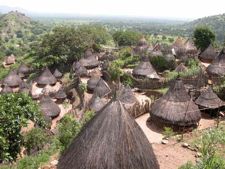 |
|
